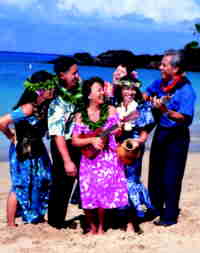The Spirit of Aloha

The Aloha Spirit
The Aloha Spirit is what makes Hawaii so special. Based on native Hawaiian traditions of kindness, hospitality and living in harmony, Aloha is everywhere in Maui.
The Ka'anapali Beach Hotel exemplifies all of these traditions and more, combining them with the utmost in customer service where travelers are treated like family, and native Hawaiian culture and cuisine are part of your everyday experience.
From the moment visitors receive a welcoming lei made of the traditional kukui nuts, to the time of leaving, when hotel staff sings a song of farewell, the hotel is about Aloha.
The famous Ka'anapali beach is steps away, spectacular golfing is minutes from the front door, and especially delicious, healthy foods are on the menus, .
But more about KBH further on.
For more about the Hawaiian Diet, see The Hawaiian Diet blog
Photos courtesy of Ka'anapali Beach Hotel, Maui
----------------------------------------------------------------------------------
Aloha Harmony
The Aloha Spirit is the traditional Hawaiian way of life and is one of the main reasons people everywhere love to visit Hawaii.
The Aloha Spirit (alo-in the presence of; and ha-breath of life) means to be in harmony with life - with people and with the earth (aloha 'aina menas love of the land) with its natural beaches, mountains, rain forest, sea and gentle climate where kindness, respect and appreciation are basic values.
Aloha is Healing
To native Hawaiians, the Aloha Spirit means compassion, healing, understanding, tolerance, patience, gentleness, forgiveness and living in harmony.
One definition of the deeper meaning of Aloha is: "the joyful sharing of life energy in the present."
One definition of the deeper meaning of Aloha is: "the joyful sharing of life energy in the present."
.
Aloha starts with awareness. As one herbal practitioner and traditional Hawaiian healer says, "Aloha has to begin with self. You have to love yourself. You have to want to heal yourself. Any aspect of dis-ease is a lack of Aloha."
"Aloha includes all the things Aloha means; there is all the respect."
"When you have respect you start to heal. When you have lokahi, (peace or unity), you start to heal. The answer is when you look inside yourself--do you feel good about yourself, are you secure of who you are, are you aware you created everything you wanted to create?"
Hawaiian Airlines, Hawaii Starts Here
------------------------
The Aloha Spirit of Hospitality
Continuing the Aloha Spirit is the Ka'anapali Beach Hotel on Maui's northwest coast--
"The Most Hawaiian Hotel" as it is called,

The Aloha Spirit in Dining
Aloha is the word in the award-winning cuisine of Tiki Terrace Restaurant at the Ka'anapali Beach Hotel.
Executive Chef Thomas Muromoto creates imaginative, delicious and healthful menus using native foods and vegetables--chicken or fish steamed in ti leaves, served laulau style in pouches, the native roots and shoots such as taro--the Hawaiian staple--Pohole Fern, Ogo Salad and favorite tropical fruits such as pineapple, mango, banana and papaya—and you won't forget the prize-winning “Banana Caramel Eruption” dessert!
It is no doubt true that what the native islanders took for granted, visitors to Hawaii are just now discovering--that the native Hawaiian diet is not only delicious, but packed with nutritional and healthful benefits. A further discovery is that this native cuisine is also excellent for weight-loss, without a sense of deprivation!
For more information on the Native Hawaiian Diet, see this page.
The Aloha Spirit
============================================================
Copyright 2006 @ The Aloha Spirit - administrator.
No articles may be used without permission of The Aloha Spirit. All rights reserved.



